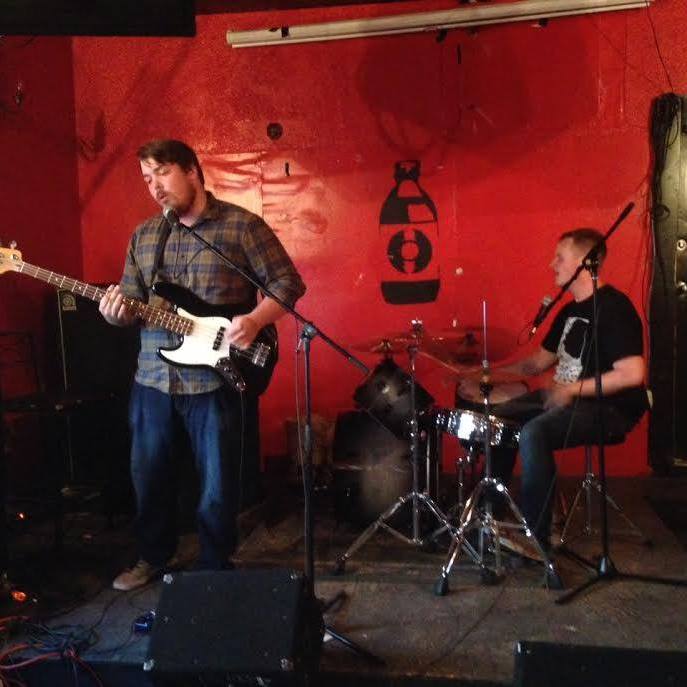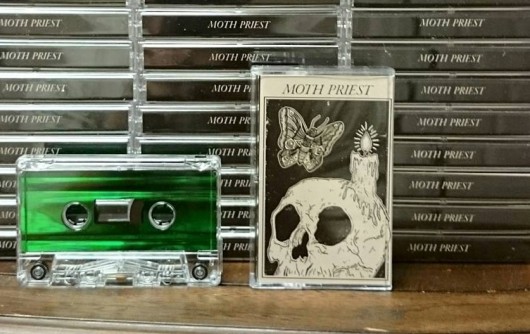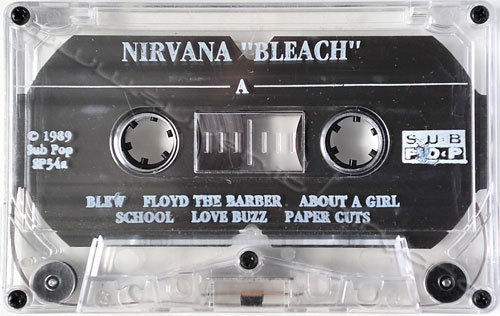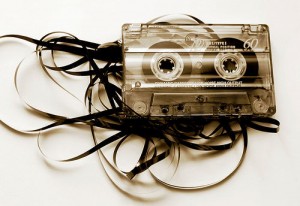CASSETTE COMEBACK: Are you kidding?!
Posted on December 10, 2015 By Mike Ross Culture, Entertainment, Front Slider, Music
 They hiss, they rattle, sometimes they get eaten. Like snakes, cassettes are great survivors.
They hiss, they rattle, sometimes they get eaten. Like snakes, cassettes are great survivors.
From the brink of extinction these humble little tapes have been revived by a thriving sub-culture of young musicians and music fans. Who would’ve thought?
Old people – who got rid of their turntables to buy tape decks, then ditched their decks to buy CD players, and then ran out to buy the expensive recordable CD-R players before realizing they were obsolete almost as soon as they came out before springing for a new iPod six months before iPods also went the way of the dodo because your phone can hold all your music and then you can drop your entire record collection into a puddle – may roll their eyes. “Oy, first vinyl comes back and now cassettes? What’s next, 8-track tapes? Wax cylinders?”
The history of recording is littered with hardware and frustrated Baby Boomers suckered into buying it.
The cassette revival is not like the reverent, almost fetishistic enthusiasm for vinyl records, which would’ve died out with the Coming of CDs were it not for DJs and audiophiles who claim vinyl sounds “warmer” than digital recordings. They may be right. There’s also the benefit of the large space on LP sleeves for cool artwork. Old people miss that.
Cassettes, not so much. For indie bands, using tapes is a matter of convenience. Fidelity is of small concern when you’re a band that rightly calls itself “a noisy bass and drum hardcore duo” – like Edmonton’s Moth Priest (above), which has two releases on cassette.
 “People think tapes have garbage sound quality, but I have heard bands that sound better on tape. Bands that have a fuzzier sound work better,” says bassist Rob Hanley, who also runs Prothean Records, a local label whose only physical products are cassettes. All the acts on the label (including a Swedish screamo band called Doda Lov, add your own umlauts) post their music online, too, but it’s just not enough on its own.
“People think tapes have garbage sound quality, but I have heard bands that sound better on tape. Bands that have a fuzzier sound work better,” says bassist Rob Hanley, who also runs Prothean Records, a local label whose only physical products are cassettes. All the acts on the label (including a Swedish screamo band called Doda Lov, add your own umlauts) post their music online, too, but it’s just not enough on its own.
“I think most people would prefer to have a physical copy of the band’s release,” Hanley says. He talks about how fans sometimes even refuse to buy CDs at shows, preferring the band’s $5 tapes. Also he likes that the listening experience is different. You can’t select tracks on a cassette; “you have to listen to the whole thing.”
Hanley, who is 23 years old, adds, “I had some CDs in high school, but I sort of grew out of them.”
Kris Burwash at Listen Records, a local CD and vinyl store, has a number of cassettes in stock – including a major label tape reissue of Nirvana’s 1989 album Bleach. He reports that cassettes are certainly more prevalent that they were 10 years ago. The demand may or may not be driven by the dreaded “hipsters” that may or may not exist. It’s no surprise, however.
 “Historically, in the ‘80s, underground music was a huge tape scene,” Burwash says. “If you were putting out obscure, weird, underground music and didn’t have a huge audience or the money or backing to manufacture LPs, you’d put it out on cassette. There is a certain kitsch factor, but that’s far less relevant. The real tape scene is small, local bands.”
“Historically, in the ‘80s, underground music was a huge tape scene,” Burwash says. “If you were putting out obscure, weird, underground music and didn’t have a huge audience or the money or backing to manufacture LPs, you’d put it out on cassette. There is a certain kitsch factor, but that’s far less relevant. The real tape scene is small, local bands.”
Tapes are cheap to make – about $1.50 per unit compared with up to $3 per CD – and the turnaround is quick. Burwash says that the wait for a vinyl pressing can be up to a year. They shouldn’t have been so hasty in closing all those pressing plants.
Some cassette collectors are just carrying on the hobby from their youth. Local cassette enthusiast and musician Andrew Hall, 33, says cassettes were the first medium on which he owned music as a kid. He’s been collecting ever since, even when CDs got popular, “I stuck with it, making mix tapes and whatnot,” he says. “People say you can find anything on the Internet these days, but that’s just not true. There was so much stuff that was only released on cassette. It’s the only way you can find it, this weird physical artifact.”
These remarkable little tape boxes even have copy protect – popping out the little tab on the side, or covering up the hole with a piece of tape, depending. Portability is another benefit. Hall listens to a lot of music on his Walkman, which he takes very good care of. “They’re remarkably hard to find, even second hand.” He claims not to be an audiophile, and says they sound pretty good. Sony needs to start making Walkmans again.
“Mixtapes” made (burned) on CD, Hall says, “show a lack of effort,” especially if it’s a gift. Making a mix CD is as easy as a couple of clicks. When you select songs for a cassette, you have to find the recording, get the hardware, plug in the input jacks, put in the tape, run it past the leader, check the levels, press record and listen to the whole thing – and then do it again for every song. Flip for side B and repeat. It shows you care.
 When even a 23-year-old noise-rock musician who wasn’t alive when cassettes fell out of favour starts to value the antiquated recording medium for its physical, tangible presence, you know something’s going on. It is an interesting object. As with vinyl records, you can look at a cassette and sort of see how it works, the tiny tape, the wee gears, the little pads, how it all seems to play smooth for such elegant simplicity, until inevitably, it gets eaten from overplaying. The streets of the 1970s and 1980s were be-ribboned with the guts of eviscerated cassette tapes. Hardy little beasts, invented in 1962, some cassettes could even carry on after having been tangled in the deck, as long as you wind it back carefully (a Bic pen works well) and avoid playing over the scrunched part in the future.
When even a 23-year-old noise-rock musician who wasn’t alive when cassettes fell out of favour starts to value the antiquated recording medium for its physical, tangible presence, you know something’s going on. It is an interesting object. As with vinyl records, you can look at a cassette and sort of see how it works, the tiny tape, the wee gears, the little pads, how it all seems to play smooth for such elegant simplicity, until inevitably, it gets eaten from overplaying. The streets of the 1970s and 1980s were be-ribboned with the guts of eviscerated cassette tapes. Hardy little beasts, invented in 1962, some cassettes could even carry on after having been tangled in the deck, as long as you wind it back carefully (a Bic pen works well) and avoid playing over the scrunched part in the future.
CDs, on the other hand – hard, flat, plastic, cold – don’t even last as long as cassettes, it turns out, and there are few worse sounds in the world than a skipping CD player; Justin Bieber actually used the sound in one of his recent songs, if you want evidence.
Now that most – not all – recorded music is in the cloud these days, it’s unlikely CDs are going to enjoy such a strong revival in the future. Cassettes, like vinyl, are here to stay.













